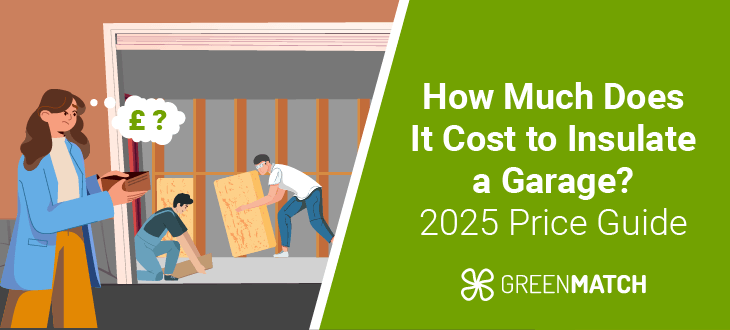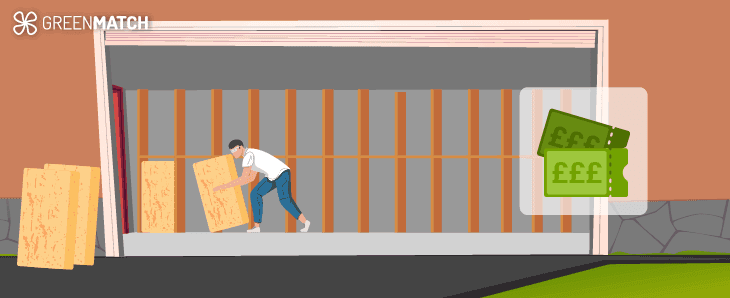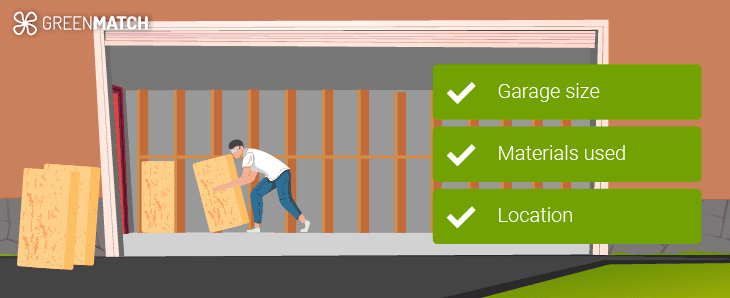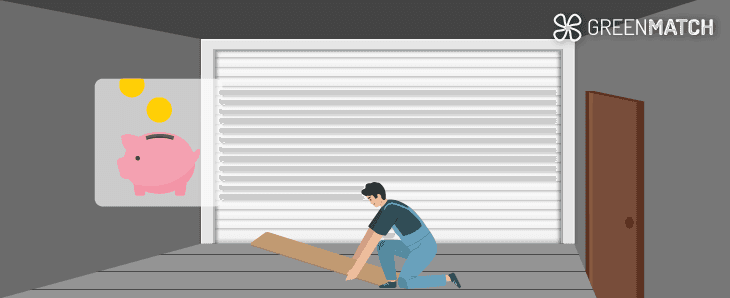Answer these simple questions and we will find you the BEST prices
Which type of solar quotes do you need?
It only takes 30 seconds
100% free with no obligation

Get Free quotes from insulation specialists near you

Save money by comparing quotes and choosing the most competitive offer

The service is 100% free and with no obligation
- GreenMatch
- Insulation
- Garage Insulation
- Garage Insulation Cost
How Much Does It Cost to Insulate a Garage? 2025 Price Guide


- Garage insulation costs typically range from £3,000 to £7,500, depending on whether it's a single or double garage and the materials used.
- Beyond garage size and materials, factors like location, professional vs. DIY installation, and plans to convert the garage into a living space also impact the total cost.
- The most cost-effective insulation options are fibreglass and rigid foam boards, but they may not reach hard-to-access areas, potentially causing condensation and thermal bridging.
Insulating your home can significantly enhance energy efficiency, and garages are no exception. Whether used for storage, a workshop, or even as a living space, a well-insulated garage can reduce heat loss, lower energy bills, and make the space more comfortable year-round.
The cost to insulate a garage in 2025 varies widely depending on factors such as garage size, insulation type, and installation complexity. Each insulation type has its price range and benefits, from affordable options like fibreglass batts to higher-end materials like spray foam.
This guide breaks down the average costs for insulating a garage in the UK, covering material prices, and additional factors like floor, wall, and ceiling insulation. By understanding the options and potential expenses, you’ll be better equipped to choose the best solution that fits your budget and insulation needs.
A great way to understand garage insulation costs and budget effectively is to get multiple quotes from different installers before making a choice. To make this easier and save you time, GreenMatch can offer a free service that provides up to four quotes at no cost—just fill out our quick 30-second form. Click below to learn more.
- Describe your needs
- Get free quotes
- Choose the best offer
It only takes 30 seconds



Garage insulation cost in the UK

Insulating a garage in the UK enhances comfort, cuts energy costs, and reduces your carbon footprint, with attached garages seeing particular benefits. Full insulation for single garages typically costs £3,000 to £4,500, while double garages range from £5,000 to £7,500. For general estimates, budget between £35 to £45 per m2. However, insulating specific parts of the garage instead of the entire space can reduce costs. Here are average costs for insulating different garage areas
| Area | Average costs |
|---|---|
| Garage door | £100 to £200 |
| Garage floor | £40 per m2 |
| Garage roof | £40 to £50 per m2 |
| Garage walls | £50 to £55 per m2 |
There are various options for insulating a garage, with insulating garage walls being the most expensive. Although it requires a higher upfront cost, insulating the walls provides the best thermal performance, leading to substantial energy savings over time. This means that the initial investment can be offset by long-term reductions in energy bills.
In addition to the specific areas you choose to insulate affecting the overall cost, the insulation material you select also plays a significant role. Here are the average costs of garage insulation materials per m2:
| Material | Cost per m2 |
|---|---|
| Fibreglass | £10 |
| Rigid foam boards | £10 to £21.50 |
| Cellulose | £11 |
| Mineral wool | £18.20 |
| Sheep wool | £19.75 |
| Spray foam | £21.50 or more |
Each insulation material has unique advantages and may be better suited to different garage areas. For example, pitched ceiling insulation often pairs well with spray foam to ensure thorough coverage in hard-to-reach areas. This comes at a higher price but will prevent thermal bridging and condensation from occurring.
If you need help determining which material best fits your budget and requirements, consulting a trusted insulation specialist can help. At GreenMatch, we make it easy by providing up to four free quotes—fill out our quick 30-second form, and we'll connect you with top specialists as soon as possible. Click below to learn more.
- Describe your needs
- Get free quotes
- Choose the best offer
It only takes 30 seconds



What factors affect the cost of insulating garage

The cost of insulating a garage in the UK varies based on several factors, including garage size, insulation type, location, and additional considerations like accessibility and installation method. These elements collectively influence the overall budget, and understanding them can help you make an informed decision. Here are the key factors that affect the cost of insulating a garage:
- Garage size: Larger garages require more insulation material, which raises costs proportionally. The scope of the project grows with square footage, impacting both material and labour expenses.
- Type of insulation: Different insulation materials come with different price tags. Spray foam, for example, is generally more expensive due to its high insulation value and seamless application, ideal for covering gaps in hard-to-reach areas. Fibreglass and cellulose, on the other hand, are more affordable but may require additional layers to meet thermal requirements.
- Location: Labor costs vary significantly based on location. Urban areas in the UK generally have higher labour rates than rural regions, which can influence your overall insulation budget.
- Accessibility: If the garage is challenging to access, such as those with limited space or complex layouts, installation costs may be higher. Professionals may need to use specialised equipment or techniques to apply insulation in confined areas, increasing labour fees.
- Professional installation vs. DIY: Hiring professionals typically incurs higher upfront costs than a DIY approach but ensures the insulation is installed to a high standard. This can reduce future repair costs and increase energy efficiency.
- Additional garage conversion costs: If you're converting your garage into a habitable space, factors like replacing the flooring, insulating walls, and installing utilities add to the overall cost. For example, a new concrete floor may be necessary if the existing surface is uneven or damaged. Stud walls with insulation can improve energy efficiency, and installing utilities like water or gas lines for a kitchen or bathroom can raise the budget significantly.
When planning your garage insulation project, working with a trusted insulation specialist can help tailor the work to your specific needs and budget, ensuring high-quality insulation that meets thermal performance standards.
What is the cheapest way to insulate a garage?

The most affordable way to insulate a garage involves using cost-effective materials like fibreglass batts, rigid foam boards, or DIY options. Choosing the right method can keep expenses low while boosting energy efficiency, though a professional installation can further enhance insulation effectiveness.
- Fibreglass batts: Fibreglass is one of the most budget-friendly options, costing around £10 per m2. Available in rolls or batts, it fits easily between wall studs and ceiling joists. While it offers moderate thermal performance, it is effective for general insulation needs in garages that don’t require high R-values. However, fibreglass is prone to moisture absorption, so a vapour barrier is recommended to prevent mould and dampness.
- Rigid foam boards: Made from polystyrene or polyisocyanurate, rigid foam board insulation costs around £10 to £21.50 per m2. The foam board is moisture-resistant, making it a good choice for garages exposed to humidity.
- Focus on targeted insulation: Rather than insulating the entire garage, focus on budget-friendly areas like the floor. Garage floor insulation costs around £40 per m2 and can improve comfort while reducing heat loss by up to 15%. This method is cost-effective for making an impact without insulating every surface.
- Reflective foil: For garages that aren’t used year-round, reflective foil is an inexpensive option, typically costing £12 to £33 depending on size and thickness. Best used on garage doors or sun-exposed walls, it reflects radiant heat. It helps moderate temperatures, though it’s less effective in colder climates.
- DIY options: Using recycled materials like old carpet padding or blankets is an ultra-low-cost solution. Although these don’t meet thermal standards, they provide minimal insulation at no extra expense.
While these options reduce costs, professional installation is recommended for maximum insulation effectiveness. A skilled installer ensures proper sealing and helps avoid issues like moisture buildup or air gaps, creating an efficient and comfortable garage space. At GreenMatch, we can connect you with top insulation professionals in your area. Fill out our 30-second form, and we’ll provide up to four free quotes—no hidden costs, no obligations. Click below to learn more.
- Describe your needs
- Get free quotes
- Choose the best offer
It only takes 30 seconds



FAQ
The cost to insulate a garage in the UK typically ranges from £35 to £45 per m2, depending on the type of insulation material, installation complexity, and specific areas being insulated.
Yes, insulating a garage is worth it, as it improves energy efficiency, enhances comfort, protects stored items, and can increase the overall value of your home.
The cost to insulate a finished garage generally ranges from £3,000 to £7,500, depending on the size of your garage and the materials you use.
The cheapest way to insulate a garage is to use fibreglass batts or rigid foam boards, which cost around £10 to £21.50 per m2 and provide effective basic insulation when installed properly

Caoimhe is an experienced content writer and researcher who is passionate about providing accessible information to every reader. With a background in English literature and Sociology, she combines the two disciplines to create cohesive, well-thought-out, and well-informed pieces.
We strive to connect our customers with the right product and supplier. Would you like to be part of GreenMatch?

